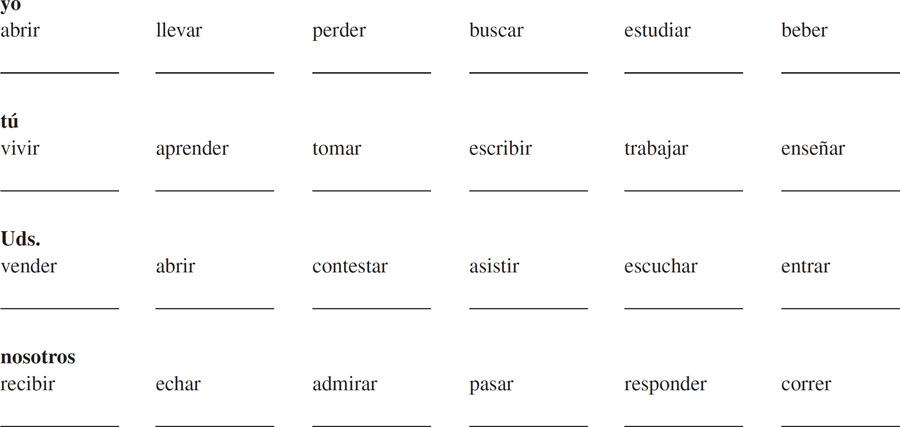
Progressive tenses are compound tenses consisting of the appropriate tenses of estar and the present participle.
Present Participle: The present participle is formed by adding the ending -ando or -iendo to the infinitive stem.

Note: The present participle has only one form; it does not distinguish person or number.
Estar to be (in a state or condition) (see page 112 for complete verb).
Present Progressive: The present progressive is formed with the present tense of estar plus the present participle. It is used to describe action thought of as in progress.

Past Progressive: The past progressive is formed with the imperfect tense of estar plus the present participle. It describes action which was in progress at a given moment in the past.

Note: The present and past progressive tenses are used to express present or past (imperfect) action when that action is thought of as continuing or in progress. They are thus a more vivid, dramatic substitute for the present and imperfect, respectively. The estar verb indicates the person and number of the subject; the participle always remains the same.
Write the present participles of the following infinitives:

Write the present progressive form that corresponds to the subject:

A. Write the past progressive form for the subject indicated.
1. Juan (llevar) _________________________
2. tú (estudiar) _________________________
3. vosotros (trabajar) _________________________
4. Pepe y yo (subir) _________________________
5. ellas (correr) _________________________
6. mi amigo (escuchar) _________________________
7. los niños (jugar) _________________________
8. nosotros (escribir) _________________________
9. tú (comer) _________________________
10. ella (partir) _________________________
11. ella y yo (tomar) _________________________
12. él y ella (acabar) _________________________
13. yo (responder) _________________________
14. ellos (decidir) _________________________
15. él (cubrir) _________________________
B. Change the present and imperfect verbs so that they express action in progress, keeping the original subject.
1. reciben _________________________
2. trabajábamos _________________________
3. abrís _________________________
4. preguntabais _________________________
5. no escuchaba _________________________
6. vivimos _________________________
7. bebe _________________________
8. Uds. asistían _________________________
9. vendes _________________________
10. Ud. no tomaba _________________________
11. enseñaba _________________________
12. contestáis _________________________
13. Ud. estudia _________________________
14. no comía _________________________
15. aprendo _________________________
Express each English verb two ways:
Write in Spanish:
1. you (pl., for.) will attend _________________________
2. I was admiring _________________________
3. you (s., fam.) will offend _________________________
4. I should bother _________________________
5. you (pl., fam.) are looking for _________________________
6. you (s., for.) would not discuss _________________________
7. I was insisting _________________________
8. she is studying _________________________
9. I will go up _________________________
10. he would admire _________________________
11. they were responding _________________________
12. he is not bothering _________________________
13. will they discuss? _________________________
14. he was working _________________________
15. you (s., fam.) are not running _________________________
16. he will listen _________________________
17. she was entering _________________________
18. we are spending _________________________
19. we would cover _________________________
20. they were cleaning _________________________
21. I will not open _________________________
22. you (pl., fam.) would lose _________________________
23. you (s., for.) are calling _________________________
24. he will clean _________________________
25. you (s., fam.) will teach _________________________
26. you (pl., fam.) are working _________________________
27. he will throw _________________________
28. I was writing _________________________
29. they are drinking _________________________
30. she would admire _________________________
31. we were calling _________________________
32. he was discussing _________________________
33. I will admire _________________________
34. you (s., for.) would bother _________________________
35. they will spend _________________________
36. you (pl., for.) would write _________________________
37. they were deciding _________________________
38. he will respond _________________________